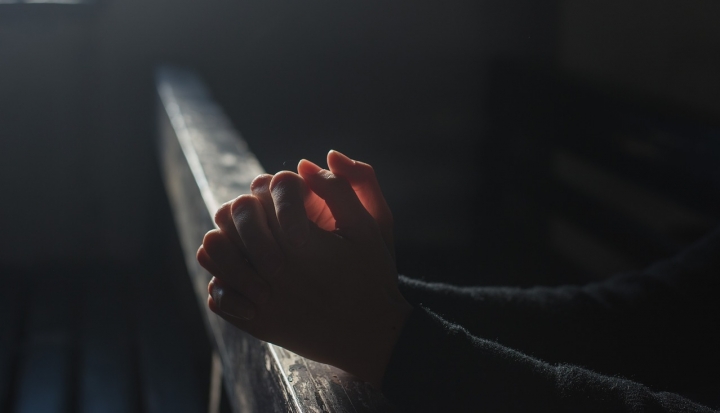Catholics have a responsibility to minister out of our gifts and experiences, says Deacon Tom Lambert, of the Archdiocese of Chicago. For him, that means responding to the lack of mental health resources in the church.
“My oldest daughter has a mental illness,” Lambert says. “And after she was diagnosed one of the first things my wife and I did was look to the church for mental health resources. But there weren’t any, especially not in Chicago. And as we met others who were concerned about the same need, we decided we had to do something.”
As a result, Lambert helped found the Chicago Archdiocesan Commission on Mental Illness and the National Catholic Partnership on Disability’s Council on Mental Illness. Twenty-five years later he continues to work at the intersection of Catholicism and mental health by serving on boards, doing workshops for deacons and parishes, advocating for mental health resources within religious communities, and organizing an annual Mass in Chicago celebrating people with mental illness and their families.
Lambert says that while there are more resources for people with mental illnesses and their loved ones than when he started looking, there is still an unrecognized need for the church to be involved. “We don’t always meet people’s needs where they’re at,” he says. “We’re speaking our language, not theirs.”
Why is it so vital that the Catholic Church be involved in mental health?
One in four people deal with a mental illness in any given year. For 1 in 22 people, that illness is persistent and chronic. These people are in our pews, in our neighborhoods, and in our families. These are the people we need to really care for, yet we don’t talk about mental health.
Because mental illness is so stigmatizing, people feel they’re going through this alone. Showing them that there are those who accept them for who they are and what they’re going through and love them for who they are is the ultimate spiritual gift we can bring.
One of the most healing things we can do as people of faith is to listen to others, hear what they’re going through, and meet their spiritual needs.
There’s a growing realization that faith communities are an important part of caring for people affected by mental illnesses. Mental health used to be treated like a physical ailment. Doctors would treat the illness, not a person’s mind or soul. But today care is beginning to be more holistic, treating patients as whole people and addressing their spiritual, physical, and mental needs together.
Many people with severe mental illness have perhaps lost all their friends or even their families; they have no support systems. But if parishes and religious communities can support people as they move through the therapy process, chances of a good outcome are pretty significant. That’s the church’s key role: to support.
What I love is that scientists are starting to agree. The American Psychiatric Association (APA) came out a few years ago with a guide for faith leaders on the importance of spiritual support in the recovery process. This is the APA, not the Catholic Church.
How can you show that support on an individual level?
A lot of times people ask me, “Why did God do this to me?” And I help them to see that God’s plan is not to punish people. Genesis says that God loves us, cares for us, and created us all as original blessings. We are all created in God’s image. We all have dignity and value. Helping people understand that is spiritually nourishing.
There’s no big theological breakthrough here. It boils down to Christ’s two commandments: love God and love your neighbors. We are called to do what Jesus did, to accompany people and listen to them. I can’t emphasize this enough: The most healing thing I’ve seen in my years of experience is just being there for somebody.
I do this not just because I’m a good guy. My faith says that we’re all worth something. This is what makes a difference in people’s lives. It’s telling people that they don’t have to handle this by themselves: God is there.
How do we know God is there? Well, we know others are there for us. And that reemphasizes the fact that God is there, too. That’s really powerful.
How can the church work to better the mental health care system in our country?
The church isn’t trying to provide services itself, but instead to support the people searching for these services. From a justice standpoint, part of this means putting more pressure on legislators to fund programs that support those suffering with mental illness to make sure that everyone has equal access to these resources.
The church has two roles to play. One is supporting people who are dealing with mental health issues, as I’ve said. The second is a justice issue. People are not getting the care to which we all have a right.
Data shows that funding a good mental health system means that governments spend less in other services. The classic example is the fact that right now the largest providers of mental health services in the country are jails in Los Angeles, Rikers’ Island in New York City, Cook County, Illinois, and Houston. And that’s just in the psychiatric parts of the jails; this doesn’t count people in the general population, where the Department of Justice estimates that at least 50 percent of people are dealing with untreated mental illnesses.
Once released from prison, people maybe get three weeks of medication, and that’s it. There’s no additional treatment. Many go to prison due to symptoms of their illness, and many may self-medicate or wind up in jail again. The recidivism rate is very high among ex-offenders with mental health issues.
At the same time, while there are good community providers of mental health services, they can’t meet the demand. Even if people have insurance, it often takes six to nine months to get a psychiatrist appointment, and many people can’t wait. If they don’t have insurance, it could take even longer.
Does the church do anything that hinders us from welcoming people with mental illness?
Within the church, the vast majority of people, whether priests or laypeople, want to help others. But some people just don’t understand mental health or mental health ministry. Some people assume that there’s no one with mental illness in their parish. I’ve had other priests tell me, “We don’t want to do [mental health ministry] in our parish.” I can only presume it’s because they’re afraid they’ll suddenly have a crowd of mentally ill people coming to their parish.
I’ve given workshops around the country where people have told me they’ve heard sermons on the evils of medication. I’ve heard stories of priests going to the hospital to visit people who have attempted suicide and telling them to stop because their behavior is evil. Priests have told family members that their loved one is in hell if they died by suicide.
These stories may not be common, but it takes only one bad reaction to create a lot of problems and a lot of misunderstandings. It boils down to a lack of understanding and compassion. The church is called not to act out of ignorance but instead to see people’s lives through their own eyes. That’s what a parish needs to do in order to understand people’s needs.
There is still a stigma against mental illness that keeps people from getting help. There are estimates that half of all people suffering from mental illness do not seek help because they’re afraid of being discriminated against. And I get it, society still has these old concepts about what mental illness is, old stereotypes from One Flew Over the Cuckoo’s Nest and other movies. Or when there are headlines about some horrific thing that happened, it’s often pointed out that it was by a person with mental illness.
How can the church prevent these misunderstandings?
Three things: awareness, acceptance, and accompaniment. It starts with awareness: educating people about what mental illness is to destigmatize it. I call it “building ramps for the mind.” We build ramps for the physically handicapped, now it’s time to start building ramps that let people feel safe and able to talk about mental health so they know that the church is a place that understands. This happens through bulletin articles, preaching, and training ushers and greeters. All of this welcomes people into the church and opens a parish up for having conversations.
The second step is acceptance: accepting people for who they are. A lot of the time we only want to accept people as we want them to be, not for who they really are. We need to understand that there are people who have limitations and to welcome them. If people are on medication, for example, sometimes it can affect their energy or their abilities.
The third thing is to accompany people. Parishioners don’t have to be psychiatrists, but we all have a spiritual calling to stand with people. I tell people that you don’t have to be an oncologist to accompany people with cancer, and you don’t have to be a psychiatrist to accompany people with mental illness.
Do you have any examples of parishes that do this well?
Saint Damian in Oak Forest, Illinois. A couple of years ago, a group of people came together and said, “We need to be doing something about mental health here.” And the result was just a wonderful example of bottom-up ministry.
They got permission from parish leadership, and they started holding meetings. They attended the workshops my wife and I put on for the Chicago Archdiocese. They hosted some talks at the parish; I did one. They found a resource called Living Grace that offers a 12-week program on spirituality, education, and mental health and suggestions for what individuals can do. And over time they formed this group that was not just interested in doing something but committed to it. They sought out the available resources and brought them into the parish. They are a wonderful model of how this should work, and I always point to them as examples in my talks.
The other example I always point to is Faith & Fellowship in Oak Park, Illinois. The founder, Connie Rakitan, started a support group in her parish that began 30 years ago as a group for people with mental illness living in a nearby nursing home, although anybody can come. They meet twice a month for fellowship and prayer. The program also involves a one-on-one relationship. If there are 10 people from the nursing home, then there are 10 other people who are accompanying them and joining them in fellowship.
The impressive thing about this program, from my perspective, is how it serves people who would otherwise feel very isolated. Second, the program draws in seminarians from Catholic Theological Union in Chicago, as well as high school students who sometimes help in the summers with some of the programming. This program has so many people involved in it, from the parish and surrounding communities.
The other common model is people, such as my wife and me (she’s a spiritual director). In other words, two people in a parish who are interested in integrating an awareness of mental illness into all the different parts of the parish. In that situation, it’s not about doing a program or hosting a group, although we do have speakers every once in a while. Instead, it’s getting people comfortable with the fact that you are a listening ear and that you get what they are going through.
What does a welcoming parish look like?
My first thought is that a parish that is truly welcoming to people with mental illness has no specialized ministries or groups. Everything is one, whether it be people struggling with cancer or people with mental illness. People with mental illness should be included in all ministries, including on the parish council.
I use the example of a stained glass window in my homilies. The stained glass window is made up of small pieces of glass in different colors and shapes. Some of those pieces have bubbles in them or are otherwise imperfect, but together they tell this wonderful story. If we were to say, for example, “I don’t want any of the green pieces” or “Let’s get rid of all the pieces with air bubbles,” we would miss the beauty and the complete story of the window.
Likewise, the church must recognize that in order to get the complete story of our faith, we must all journey together and learn from one another. That is my ideal parish: One where no one imposes their personal beliefs or spiritual practices, but instead where we recognize that we are a big church with different ways of believing, and that is wonderful.
This doesn’t just include people with mental illnesses, it also includes people who’ve been through divorce, LGBT people, all the different people who exist. You can’t say, “We welcome this group or that group.” That’s not what Christ did.
The thing that is just so important to understand is what a difference it makes in people’s lives if we as a church are accepting and understanding. Sometimes that’s not an easy thing to do, but it’s what we are called to.
For 12 ways parishes can support people with mental illness, please see the sidebar that accompanies this interview.
This article also appears in the March 2019 issue of U.S. Catholic (Vol. 84, No. 3, pages 28–32).













Add comment